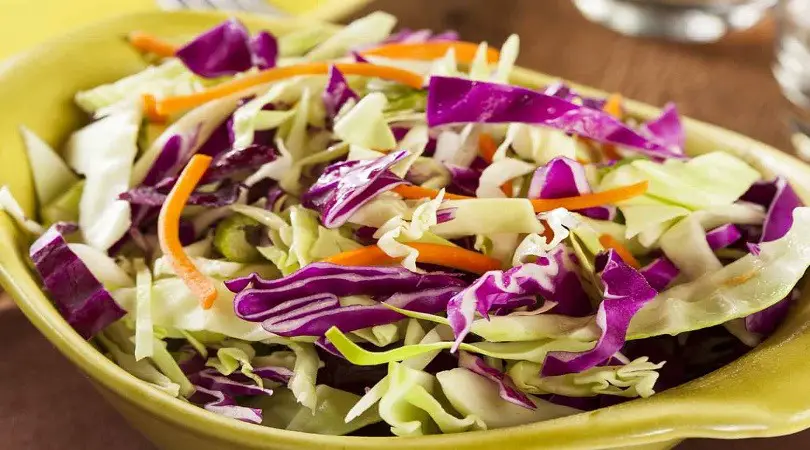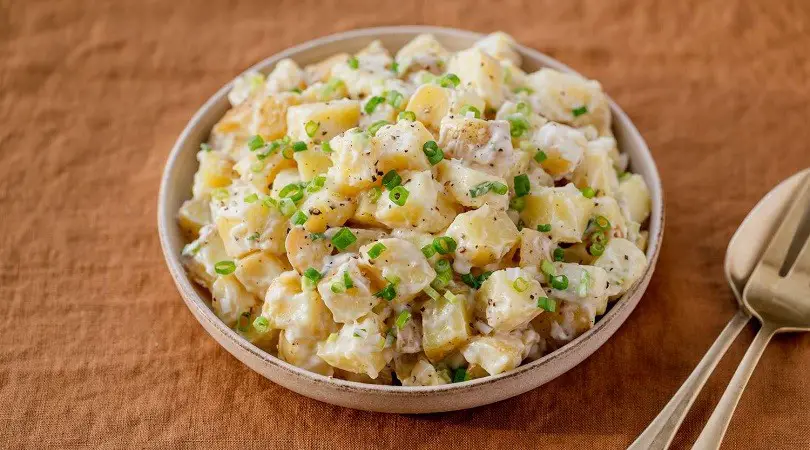Last Updated on January 6, 2025
Yes, you can safely eat coleslaw while pregnant as long as it is prepared hygienically and stored at the correct temperature. Coleslaw is a nutritious and delicious side dish made of shredded cabbage and other vegetables, typically combined with a creamy dressing.
However, it is important to make sure that the coleslaw is homemade or purchased from a trusted source to avoid any potential risks associated with raw or contaminated ingredients. Additionally, pregnant women should consume coleslaw in moderation and be mindful of any specific dietary restrictions or allergies they may have.
Overall, coleslaw can be a healthy and satisfying addition to a balanced pregnancy diet.

Credit: loveourlittles.com
Safety Concerns
Coleslaw is a popular side dish consisting of shredded cabbage, carrots, and mayonnaise-based dressing. While it can be a tasty addition to any meal, it’s essential to consider the potential risks associated with consuming coleslaw during pregnancy. In this section, we will discuss the factors to consider and how to ensure the safety of coleslaw while pregnant.
Related: Can Pregnant Ladies Eat Creme Brulee?
Potential Risks Associated With Coleslaw Consumption:
- Foodborne illnesses: Raw or undercooked cabbage and carrots used in coleslaw can harbor harmful bacteria like e.coli or salmonella, which can pose a risk to both the mother and the unborn baby.
- Listeriosis: If coleslaw is prepared with unpasteurized milk or cheese, it can increase the risk of contracting listeria, a type of bacteria that can lead to severe infections in pregnant women.
- Mercury contamination: Some coleslaw recipes may include ingredients like canned fish, such as tuna. Pregnant women should be cautious about consuming large amounts of fish due to potential mercury contamination, which can be harmful to the developing fetus.
To ensure a healthy pregnancy, it’s crucial to consider a few factors when eating coleslaw:
Factors To Consider When Eating Coleslaw While Pregnant:
- Quality and hygiene of ingredients:
- Choose fresh and crisp cabbage and carrots, ensuring they are thoroughly washed before using them.
- Opt for pasteurized mayonnaise or dressings to minimize the risk of foodborne illnesses.
- Storage and handling practices:
- Make sure coleslaw is stored in the refrigerator below 40°f (4°c) to prevent bacterial growth.
- Consume coleslaw within two to three days of preparation to minimize the risk of foodborne illnesses.
- Alternative preparation methods:
- Consider cooking the vegetables before using them in coleslaw to eliminate the risk of foodborne bacteria.
- Opt for coleslaw recipes that do not include raw or undercooked ingredients to minimize potential risks.
By following these guidelines, you can enjoy coleslaw while ensuring the safety of both you and your baby. Remember, it’s always better to be cautious and make informed decisions when it comes to your diet during pregnancy.
Benefits Of Eating Coleslaw During Pregnancy
Coleslaw is a popular dish made from shredded cabbage and carrots, mixed with mayonnaise or vinaigrette dressing. It is not only delicious, but also provides several health benefits for pregnant women. Including coleslaw in your pregnancy diet can offer the following advantages:
Nutritional Value Of Coleslaw:
- Coleslaw is a nutrient-rich dish that can boost your overall health during pregnancy.
- It contains essential vitamins and minerals that support the growth and development of your baby.
- Rich in vitamin c, coleslaw can enhance your immune system and protect against infections.
- It also provides a good amount of vitamin k, which promotes healthy blood clotting.
Essential Vitamins And Minerals:
- Coleslaw is a good source of various vitamins and minerals like vitamin a, vitamin k, vitamin c, and manganese.
- Vitamin a is crucial for the development of your baby’s eyes, skin, and immune system.
- Vitamin k aids in proper blood clotting, reducing the risk of excessive bleeding during and after childbirth.
- The high vitamin c content of coleslaw boosts collagen production, supporting healthy tissue growth and repair.
- Manganese helps with bone development and regulates blood sugar levels.
Fiber Content For Digestive Health:
- Coleslaw contains dietary fiber, which plays a vital role in maintaining healthy digestion.
- Fiber helps prevent constipation, a common discomfort during pregnancy, by adding bulk to the stool.
- It also promotes regular bowel movements, reducing the risk of hemorrhoids and other digestive issues.
- Including coleslaw in your diet can contribute to a healthy digestive system throughout your pregnancy.
Potential Positive Impact On Pregnancy Symptoms:
- Nausea and morning sickness are common pregnancy symptoms that can be alleviated by consuming coleslaw.
- The cold and crunchy nature of coleslaw can help soothe an upset stomach and provide relief from morning sickness.
- The high water content in cabbage and carrots can prevent dehydration, which often accompanies nausea.
Improved Digestion And Regularity:
- Coleslaw’s fiber content aids digestion by promoting the healthy functioning of the digestive tract.
- It can help regulate bowel movements and prevent constipation, which is common during pregnancy.
- By improving digestion and regularity, coleslaw can help pregnant women feel more comfortable and avoid gastrointestinal issues.
Including coleslaw as part of your pregnancy diet can provide a range of health benefits, from boosting immune function to supporting proper digestion. Its nutrient-rich composition and potential alleviation of pregnancy symptoms make it a nutritious and delicious addition to your meals.
However, as with any food, it is essential to consume coleslaw in moderation and ensure the quality and freshness of ingredients for optimal safety and enjoyment.
Related: Can I Eat Fried Calamari While Pregnant?
Making Safe Homemade Coleslaw
Craving a refreshing bowl of coleslaw during your pregnancy? You’ll be glad to know that indulging in this creamy and crunchy treat can be perfectly safe when prepared with a few key considerations. By following proper food hygiene practices and selecting the right ingredients, you can enjoy a homemade coleslaw that not only satisfies your taste buds but also keeps you and your little one safe.
Choosing Fresh And Safe Ingredients:
When making coleslaw from scratch, it’s important to start with fresh and safe ingredients. Opting for organic produce can be a good choice as it reduces the risk of exposure to harmful pesticides. Additionally, ensure that your vegetables are firm, vibrant, and free from bruises or blemishes.
Choosing ingredients that are in season will also enhance the flavors of your coleslaw.
- Select crisp and fresh cabbage, carrots, and other vegetables.
- Avoid using wilted or damaged vegetables.
- Opt for organic produce to minimize pesticide exposure.
Importance Of Washing Vegetables Thoroughly:
Washing vegetables properly is essential to remove any dirt, bacteria, or pesticide residues that may be present. It’s crucial to pay special attention to leafy greens and root vegetables as they are prone to contamination. Follow these steps to ensure your vegetables are thoroughly washed:
- Rinse vegetables under cold running water.
- Use a vegetable brush to scrub root vegetables.
- Remove outer layers of cabbage or lettuce leaves.
- Dry the vegetables with a clean paper towel to remove excess moisture.
Selecting Pasteurized And Safe Dairy Products:
If your coleslaw recipe includes mayo or other dairy products, it’s crucial to choose pasteurized options. Pasteurization helps eliminate harmful bacteria and ensures the safety of the product. When purchasing dairy products, look for the word “pasteurized” on the label.
- Opt for pasteurized mayonnaise, sour cream, or yogurt.
- Check the label for the word “pasteurized.”
Hygiene And Food Preparation Practices:
Maintaining good hygiene while preparing homemade coleslaw is vital in preventing any foodborne illnesses. Make sure to follow these simple yet effective hygiene practices:
- Wash your hands thoroughly before handling ingredients.
- Clean and sanitize any utensils, cutting boards, and countertops.
- Avoid cross-contamination by using separate utensils for raw and cooked ingredients.
Proper Storage And Temperature Control:
Storing coleslaw at the correct temperature is crucial to prevent the growth of harmful bacteria. Follow these guidelines to ensure your coleslaw remains fresh and safe to consume:
- Refrigerate coleslaw promptly and keep it stored at or below 40°f (4°c).
- Consume coleslaw within 2-3 days to maintain freshness.
- Avoid leaving coleslaw at room temperature for extended periods.
Handling And Cross-Contamination Prevention:
To minimize the risk of cross-contamination, proper handling of all ingredients is key. Follow these tips to ensure the safety of your homemade coleslaw:
- Keep raw vegetables separate from other ingredients to prevent cross-contamination.
- Use clean utensils and cutting boards when handling different ingredients.
- Store raw meat or seafood away from vegetables to prevent contact.
By following these guidelines, you can prepare delicious and safe coleslaw that satisfies your pregnancy cravings without compromising your health or the health of your baby. Enjoy your homemade coleslaw worry-free and relish in the flavors while nourishing your body.
Health Considerations For Store-Bought Coleslaw
Store-bought coleslaw can be a tasty addition to your meals, especially during pregnancy when you might be craving something refreshing and crunchy. However, it’s important to consider some health factors before enjoying this popular side dish. Here are some key points to keep in mind when it comes to store-bought coleslaw:
Understanding Label Information And Ingredients:
- Always read the label carefully before purchasing store-bought coleslaw. Look for information such as the expiration date, storage instructions, and any allergy warnings.
- Check the list of ingredients to get an idea of what the coleslaw contains. Choose options that have fresh vegetables, such as cabbage and carrots, and minimal additives or preservatives.
- If you have any specific dietary restrictions or concerns, look for brands that offer organic or gluten-free options.
Potential Risks Associated With Store-Bought Coleslaw:
- One of the main risks associated with store-bought coleslaw is the potential presence of harmful bacteria, such as e. coli or salmonella. These bacteria can cause food poisoning and pose a higher risk to pregnant women due to the weakened immune system during pregnancy.
- Another concern is the use of additives and preservatives in coleslaw. Some store-bought varieties may contain high levels of sodium or added sugars. It is important to be aware of these ingredients and consume them in moderation.
Presence Of Harmful Bacteria Or Additives:
- When coleslaw is prepared at a store or deli, it is crucial to ensure that proper food handling procedures have been followed. This includes maintaining the correct temperature, clean equipment, and hygienic practices.
- To reduce the risk of consuming harmful bacteria, it’s advisable to choose freshly made coleslaw prepared in smaller batches, as it is less likely to sit for long periods on display.
Sodium And Sugar Content:
- Store-bought coleslaw can vary in terms of sodium and sugar content depending on the brand and recipe. Excessive sodium intake can increase blood pressure, while too much sugar can contribute to gestational diabetes and excessive weight gain during pregnancy.
- Opt for coleslaw varieties that have lower sodium and sugar content, or consider making it at home using fresh ingredients, allowing you to control the amount of these additives.
By being mindful of label information, ingredients, potential risks, harmful bacteria or additives, as well as the sodium and sugar content, you can enjoy store-bought coleslaw safely during pregnancy. Remember, it’s always a good idea to consult with your healthcare provider if you have any specific concerns or dietary restrictions.
So go ahead and savor that delicious bowl of coleslaw, keeping your health and the well-being of your baby in mind.
Related: Can You Eat Lactation Cookies While Pregnant?
Tips For Eating Coleslaw At Restaurants
Coleslaw is a popular side dish that many people enjoy, especially when dining out at restaurants. However, if you are pregnant, you may have some concerns about whether it is safe to consume coleslaw during this time. In this section, we will provide you with some tips to help you navigate the world of coleslaw when dining out.
Assessing The Quality And Safety Of Coleslaw Dishes
When ordering coleslaw at a restaurant, it is essential to assess the quality and safety of the dish. Here are some key points to consider:
- Look for freshly prepared coleslaw: Opt for coleslaw that is made from fresh ingredients and prepared on-site. Avoid choosing coleslaw that has been sitting out for an extended period.
- Check the appearance and aroma: Ensure that the coleslaw looks fresh and appetizing. It should have a pleasant aroma, free from any off-putting smells.
- Consider the source of ingredients: Inquire about the source of the coleslaw’s ingredients. Fresh, locally sourced produce is generally a safer option.
- Choose reputable restaurants: Select restaurants with good hygiene practices and high-quality standards. This can provide additional assurance of safe coleslaw consumption.
Ensuring Proper Food Storage And Handling
Proper food storage and handling play a crucial role in maintaining the safety of coleslaw dishes. Here are some important considerations:
- Check for refrigeration: Confirm that the coleslaw has been stored at the appropriate temperature. It should be chilled below 40°f (4°c) to prevent bacterial growth.
- Avoid cross-contamination: Ensure that the coleslaw has been stored separately from raw meat, poultry, and seafood. This reduces the risk of cross-contamination and foodborne illnesses.
- Assess cleanliness and food handling practices: Observe the restaurant’s cleanliness and the staff’s adherence to safe food handling practices. This can give you an indication of the overall food safety measures in place.
Communicating Dietary Restrictions To The Restaurant Staff
If you have specific dietary restrictions or concerns, it is important to communicate these to the restaurant staff. Here are some tips for effective communication:
- Be clear about your needs: Clearly articulate your dietary restrictions, including any concerns regarding coleslaw consumption during pregnancy.
- Request information about ingredients: Ask for a list of ingredients used in the coleslaw recipe to ensure it aligns with your dietary requirements.
- Inquire about preparation methods: If you have concerns about certain preparation methods, such as the use of raw eggs in the dressing, don’t hesitate to ask for clarification.
- Consider alternatives: If you feel unsure about the safety of coleslaw, ask the staff for alternative salad options that are safe for you to enjoy.
Alternatives To Coleslaw At Restaurants
If you prefer to avoid coleslaw altogether, there are other salad options that provide similar nutritional benefits. Consider the following alternatives:
- Garden salad: Opt for a fresh garden salad with a variety of vegetables and a light dressing. This can be a nutritious and safe choice.
- Caesar salad without raw eggs: Caesar salad can be a great alternative if you request it without raw eggs in the dressing. Just ensure that the restaurant uses pasteurized eggs or egg substitutes.
- Greek salad: Enjoy a greek salad with cucumbers, tomatoes, olives, and feta cheese. This flavorful option is loaded with nutrients.
- Spinach salad: Spinach salad is packed with iron and other essential vitamins. Choose a dressing that meets your dietary restrictions.
Remember, your health and baby’s well-being are of utmost importance during pregnancy. By following these tips, you can make informed choices when it comes to eating coleslaw or exploring alternative salad options at restaurants.
Frequently Asked Questions Of Can I Eat Coleslaw While Pregnant?
Can I Eat Coleslaw While Pregnant?
Yes, you can eat coleslaw while pregnant as long as it is properly prepared and stored to avoid foodborne illnesses.
Is Coleslaw Safe For Pregnant Women?
Yes, coleslaw is safe for pregnant women to consume as long as it is made with fresh, washed ingredients and mayonnaise is pasteurized.
What Are The Benefits Of Eating Coleslaw During Pregnancy?
Eating coleslaw during pregnancy can provide essential nutrients like vitamin c and fiber, which can contribute to a healthy pregnancy.
Are There Any Risks Associated With Eating Coleslaw While Pregnant?
The main risk associated with eating coleslaw while pregnant is the possibility of foodborne illnesses if the coleslaw is not prepared or stored properly.
Conclusion
Pregnant women can safely enjoy coleslaw as part of a balanced diet, but there are a few factors to consider. Firstly, ensure that the coleslaw is prepared with fresh, properly washed vegetables to minimize the risk of foodborne illnesses. Secondly, homemade coleslaw is generally a healthier choice compared to store-bought versions, as it allows you to control the ingredients and avoid additives or excessive amounts of mayonnaise.
Lastly, moderation is key. Although coleslaw is packed with vitamins and fiber, it should not replace other essential nutrients that pregnant women need. As always, it is recommended to consult with your healthcare provider for personalized advice and dietary recommendations during pregnancy.
So go ahead and indulge in some coleslaw, but remember to make mindful choices to support a healthy and well-nourished pregnancy.











